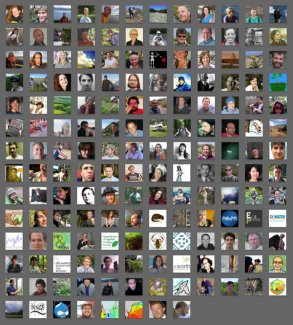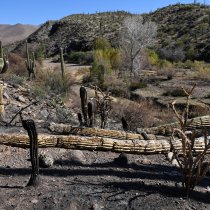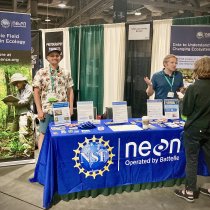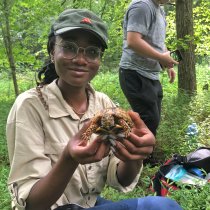Building a community that thrives online, offline and after the meeting
September 7, 2012
By Sandra Chung
 |
 |
 |
Wordles of all tweets to the #ESA2012 hashtag from (left to right) Wednesday, Thursday and Friday of the meeting week. Word size corresponds to the frequency of its appearance in tweet text. Click on a Wordle to enlarge it.
Internet memes and celebrity names was #ESA2012, a hashtag code that Twitter users used to flag tweets related to the meeting. One of the hottest social media topics of the day was a scientific meeting. It wasn't the first time that it happened, and it won't be the last. If you’d gone to twitter.com/search during the meeting and searched for #ESA2012, you would have found thousands of tweets about ESA. You would have seen in this stream of 140-character messages a conference-within-a-conference, playing out in real time (and on a monitor at the NEON booth). People at the meeting were quoting and commenting on talks and posters, sharing links to session slides and other references, and rounding up old and new friends to connect over food and drink. People who weren’t at the meeting tuned in to the conversation from afar, chimed in on the scientific and cultural discussion, and asked meeting attendees to tweet about sessions they wished they were attending. Hundreds more simply watched the stream, soaking up the information and experience. I hope one day soon they decide to participate, too.
Lubchenco: the worst outcome is to be so intimidated that we don't share what we know #ESA2012 keynote
— Ecological Society (@ESA_org) August 6, 2012
@jacquelyngill There's a mini-Tweetup happening at Rogue brewery at 7:30pm - the more the merrier! #ESAsocial #ESA2012
— Holly Bik (@Dr_Bik) August 8, 2012
#ESA2012 tweetup was a great idea. Nice meeting you guys @cboettig @miriamgoldste @sarahbisbing @bonebraking @jacquelyngill @msanclem and co
— Luke Kelly (@luketkelly) August 9, 2012
M.Kenney at #ESA2012: Getting ready to talk to a legislator about your #science? Read up on them at @thomasdotgov ow.ly/cSO12
— J. Osborne-Gowey (@JeremiahOsGo) August 10, 2012
Thanks @jenedavison & @miriamgoldste! You're tweeting my buddy C Swan's talk - like I am there in person! #ESA2012
— Holly Menninger (@DrHolly) August 10, 2012
@labroides absolutely! Hope to meet you at a future #ESA2012 tweet up!
— Karen Lips (@kwren88) August 13, 2012
It's my personal mission to help a) improve science and science communication and b) strengthen and enlarge the community of people who care about science. Twitter and blogging are two of the most powerful online tools a scientist or science communicator can employ to these ends. So I teamed up with @JacquelynGill, a paleoecology blogger, Twitter celebrity, and champion of science outreach and diversity in science, to lead a Twitter and blogging workshop at the ESA meeting. Jacquelyn and I had both been successful (her more so than me) at using social media to find great collaborators and information and to build a supportive online community that amplified our efforts and reach. We wanted other people at ESA to tune into this incredible resource. It turned out that @jebyrnes was giving a complementary talk at the meeting on how scientists can improve science by engaging with each other online. Together, we took an online science community that has been rapidly growing and gaining momentum over the past few years and gave it a firm push in the ecological direction. It took off. In less than a week, the community posted more than 3,000 tweets to the #esa2012 conference stream. In the past month, the slides from our social media workshop have been viewed more than 1,200 times on Slideshare, and Jarrett's slides from "Taking the Ecological Conversation Online" have been viewed more than 1,500 times. Scott Collins has become ESA's first tweeting President (@ESA_Prez2013), and the online ecological science community has already begun collaboratively planning social media, software, data management and career workshops for next year. There are 70% more scientists following @NEONInc, or subscribing to NEON tweets, than there were before the meeting. All this excites me beyond measure. But encouraging scientists to connect with each other online and offline doesn't just serve my personal goals. It serves NEON's mission, as well. Scientific Twitter users on the whole are open to trying new things and candid about the world as they see it. They make a practice of sharing what they find useful and exciting. It is clear from the #ESA2012 tweets that the tweeting ecological science community cares about data and about the future of ecology and science. They care about collaboration and communication, about helping each other develop and learn the tools they'll need to succeed at doing and spreading good science. This puts them solidly in the company of the people who built the LTER Network, NEON, DataONE, EarthCube, and other projects to facilitate interdisciplinary and large-scale work in environmental and ecological science. Communicating and networking with as broad an audience as possible opens up more opportunities to meet people with the same interests who can help you make something good and important happen. We still network through e-mail and meetings, but social media provide additional, supercharged tools for connecting to the people you're looking for and who are looking for you. That's why NEON's communication team maintains a strong social media presence on Twitter, in Facebook, and in this blog. We at NEON look forward to continuing to explore, develop and grow this collaborative, successful online scientific community that can only grow wings with time. So far, our blogroll features more than 60 ecologists and evolutionary biologists who are sharing their work, ideas, struggles and triumphs online. Below is a composite image of most of the scientists and science institutions that currently follow @NEON_Sci, the NEON Twitter account. There were about 100 before the ESA meeting; a month later, there are 170. These people have interesting and important things to say and share, things that can improve their science and NEON. I hope that what I share via @NEON_sci is useful to them. I'm excited to hear from them, and from you, too.




